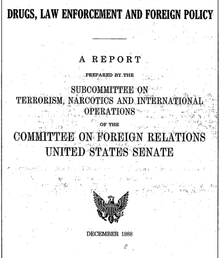Kerry Committee report

The Kerry Committee report, formally titled Drugs, Law Enforcement and Foreign Policy, was the final report of an investigation by the Senate Foreign Relations Committee's Subcommittee on Terrorism, Narcotics, and International Operations. The report examined the problems that drug cartels and drug money laundering in South and Central America and the Caribbean posed for American law enforcement and foreign policy. The Sub-Committee was chaired at the time by Senator John Kerry, so that the report is often referred to under his name.
The report was released on April 13, 1989,[1] and included discussions of drug trafficking in the Bahamas, Colombia, Cuba and Nicaragua, Haiti, Honduras, and Panama. The longest chapter in the report was on narcotics trafficking and the Nicaraguan Contras. The Subcommittee "did not find that Contra leaders were personally involved in drug trafficking,"[2] but it did find "substantial evidence" of drug smuggling by "individual Contras, Contra suppliers, Contra pilots, mercenaries who worked with the Contras, and Contra supporters."[2]
Background
Press accounts concerning links between the Contras and drug traffickers, which began with a December 1985 story by the Associated Press, led to a review by the United States Department of State, U.S. Department of Justice and relevant U.S. intelligence agencies in 1986.[3] In April 1986, the State Department informed Congress that it had "evidence of a limited number of incidents in which known drug traffickers tried to establish connections with Nicaraguan resistance groups."[3]
Hearings begin
In April 1986, John Kerry and Senator Christopher Dodd, a Democrat from Connecticut, proposed that hearings be conducted by the Senate Foreign Relations Committee regarding charges of Contra involvement in cocaine and marijuana trafficking. Senator Richard Lugar of Indiana, the Republican chairman of the committee, agreed to conduct the hearings.
Kerry's findings
The Kerry Committee report found that "the Contra drug links included ".... Payments to drug traffickers by the U.S. State Department of funds authorized by the Congress for humanitarian assistance to the Contras, in some cases after the traffickers had been indicted by federal law enforcement agencies on drug charges, in others while traffickers were under active investigation by these same agencies."[3] The US State Department paid over $806,000 to known drug traffickers to carry humanitarian assistance to the Contras.[4]
See also
References
- ↑ Peter Kornbluh (January–February 1997). "Anatomy of a Story, Crack the Contras and the CIA: The Storm Over Dark Alliance". Columbia Journalism Review. Retrieved April 22, 2006. Hosted on National Security Archives
- 1 2 Drugs, Law Enforcement and Foreign Policy, p. 2
- 1 2 3 United States Senate. Committee on Foreign Relations. Subcommittee on Terrorism, Narcotics, and International Operations. (1989). Drugs, law enforcement, and foreign policy : A report. Washington: GPO.
- ↑ Cockburn, Alexander; Jeffrey St Clair (October 1, 1999). Whiteout: The CIA, Drugs and the Press. Verso. ISBN 1-85984-258-5.
External links
- The Kerry Committee report (does not include appendices) –
- Kerry Committee Hearings Volume 1: Drugs, Law Enforcement and Foreign Policy (incomplete)
- Kerry Committee Hearings Volume 2: Drugs, Law Enforcement and Foreign Policy – Panama
- Kerry Committee Hearings Volume 3: Drugs, Law Enforcement and Foreign Policy – The Cartel, Haiti and Central America
Further reading
- McCoy, Alfred W. (May 1, 2003). The Politics of Heroin: CIA Complicity in the Global Drug Trade. Lawrence Hill Books. ISBN 1-55652-483-8.